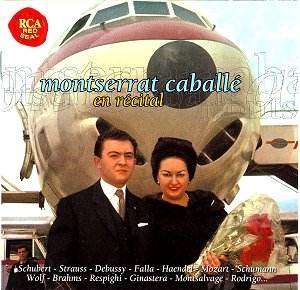The second (in my listening order Ė
so far I have reviewed "Grandes
héroïnes lyriques")
of these wonderful RCA Red Seal albums
dedicated to the early recordings which
Montserrat Caballé made in Spain
brings together lieder, mélodies
and other vocal chamber music. As well
as reminding us of the sheer untrammelled
beauty of this singerís voice in its
prime, its evenness of emission, its
steadiness and vibrancy (but completely
without the tremor which some pass off
as vibrato), qualities which can be
heard in every track, it testifies to
the sheer hard work which got her to
the top.
I was pretty rude about
her French in "Depuis le jour"
on the previous album. That was in December
1964, so Iím puzzled as to why these
July 1963 recordings already show a
determined effort to master the language.
True, those "n"s which are
supposed to disappear down the nose
("dans", "viens",
etc.) donít sound quite French, but
she does nothing glaring like turning
"de" into "des"
as she did in the Charpentier piece,
and only Frenchmen are likely to find
it a bar to enjoyment. I feel she is
too bright and present in the half-light
mysteries of "Mandoline",
which is not really a bravura piece,
but she spins a wonderfully poised line
through the others.
When singers whose
basic training is in the bel canto school
of opera turn to lieder, they tend to
go for the longer line rather than the
separated, syllable-by-syllable approach
often preferred by native lieder singers.
Caballé surprises us (though
let us remember her early years at the
Bremen Opera House) by strenuously adopting
the German style, almost obsessively
separating the syllables. She gets away
with it because the sound itself is
so beautiful. All the same, when I turned
to the versions of several of these
Strauss lieder by Katarina Karnéus
(EMI CDZ 5 73168 2) I found a more intimate
relationship between the singer and
the language, a more natural sense of
the style, and a voice no less true
and beautiful.
The question which
is bound to be asked when a full-dress
opera singer takes to this repertoire
is, is she too big for it? A few months
ago four of these Strauss songs came
my way in performances by Leontyne Price
in which it seemed that a sledgehammer
was being taken to crack a nut. Either
she was audibly holding back or she
was giving too much. When a singer like
Karnéus sings the climactic high
notes of a lied, it sounds full and
magnificent, yet you feel this is the
right sized voice for the repertoire,
for a concert hall not an opera house,
with a piano not an orchestra (Iím not
suggesting Karnéus cannot sing
some operatic roles, indeed she
does so, yet she appears at the moment
to be perfectly equipped as a lieder
singer). Now Strauss can be merciless
with his high tessitura, and when only
operatic heft will get the singer through,
Caballé has it there on tap.
But the interesting thing is that much
more often, as in the climax of Zueignung,
she sounds as if she has a voice perfectly
scaled to the job in hand, with no appearance
of holding back. What extraordinary
control she had over her vocal means.
In "Ich schwebe" she sounds
like a light and girlish fräulein,
the sort of performance Hilde Gueden
might have given. There is, here and
there, a slight price to pay in that
her high notes seem a shade pinched,
when we know that in other contexts
she can let them expand gloriously.
Itís actually easier to sing some of
these phrases in the style of Puccini,
and sometimes one wishes she would,
while at the same time applauding her
self-discipline in not doing so.
If all this adds up
to something not quite perfectly idiomatic,
it does show that Caballé had,
at this stage, the potential to become
as great a lieder singer as she became
of opera. But did she follow this up?
Even as it is, and granted a tendency
to swoon too much, there is still enough
to send any Straussian into ecstasies.
In particular, the dulcet tones of her
"Wiegenlied" are themselves
worth the price of the discs.
In the other major
offering, the Falla "7 Canciones",
she is surely on home ground, even if
the tempi in the two slower ones Ė the
"Asturiana" and the "Nana"
Ė are dangerously slow. Here, too, is
perhaps the moment to mention that Miguel
Zanetti is a positive and colourful
partner throughout.
The first part of the
album is a programme of supposed encores.
The Beethoven and the Respighi (which
is very powerfully brought off) seem
odd choices in this context but it makes
a nice "international" sequence.
The "arie antiche" sound pretty
old-fashioned and her English is poor
in the Handel but thereafter all is
well. The Spanish and Latin-American
items are all highly attractive.
So in conclusion, not
everything here is perfectly idiomatic,
but there is much to treasure and the
voice itself is a source of wonder.
Christopher Howell
MONTSERRAT
CABALLÉ: Grandes héroïnes
lyriques
Montserrat
CABALLÉ en récital: Recital
"Los Encores"
Montserrat
CABALLÉ EN DUO - Duos de Amor
Montserrat
CABALLÉ: Récital espagnol
